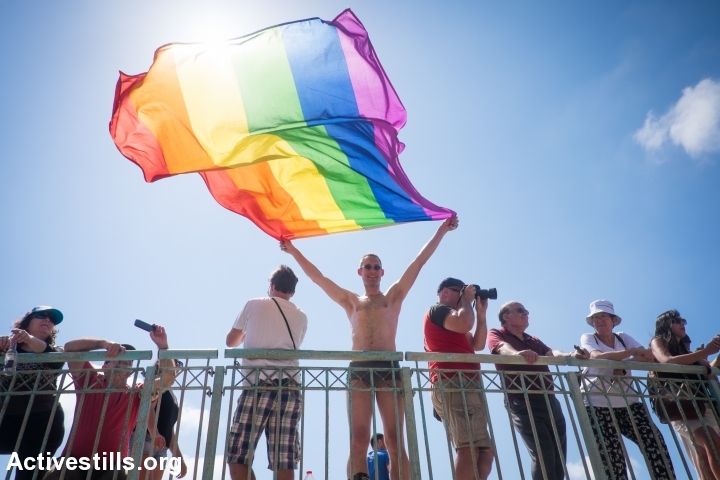We must remain critical when the Israeli government co-opts the LGBTQ struggle to divert attention from the occupation. But let’s not minimize the urgency of the situation for many queer people in Israel and across the Middle East.
By Frederick Hertz

There’s a tendency towards extreme dualism when it comes to the LGBTQ community in Israel. Two recent essays on the subject of “pinkwashing” in +972 Magazine exemplify the tendency to show that a country that does bad things (i.e. Israel) cannot possibly do anything right, and the victims (i.e. the Palestinians) can do nothing wrong. This approach pushes the entirety of Israeli gay activism into the narrow box of hasbara (propaganda by the state in an attempt to “pinkwash” the occupation) while trivializing the mistreatment of so many LGBTQ residents of neighboring countries.
Over the past five years I have met with many LGBT activists in Israel – including some brave non-Jewish ones – and I have also worked on the global effort to rescue LGBTQ refugees from a variety of Muslim communities of the surrounding region. I live far away – in Northern California – but the personal statements (often under oath as part of a refugee application) of LGBTQ residents of Syria, Jordan, Lebanon, Turkey, Egypt, and Palestine confirm that these are not happy lives.
While some (mostly older rich gay men) have been able to flourish in the upper echelons of Beirut and Amman, for the most part the fate of LGBTQ people in those countries is dire – ranging from the emotional burdens of closeted secrecy to outright torture and murder. Minimizing the seriousness of this reality weakens the credibility of otherwise valid critiques of Israel, and puts into question the motivation of LGBTQ activists who seem to have selected the truly deserving victims of the occupation as pawns in their efforts to motivate gay activists to join the anti-occupation movement.

Furthermore, in the reductive view that Israel’s LGBTQ record is mostly hypocritical or only achieved for propaganda purposes, the authors minimize the fact that within Israel, many of the leading LGBTQ activists are true human rights leaders, genuinely working to further the progress of gay rights — but also struggling to make Israel a more just society, and not just for Jewish Israelis. Some of the most effective anti-occupation organizations have been led by lesbians and gay men, and many of the LGBTQ activists also work with leftist political organizations bravely trying to stem the rightward drift of Israeli society. They, along with the courageous individuals working to transform Orthodox Jewish society and end its mistreatment of its LGBTQ members, are certainly not risking their social positions merely to help the current Israeli government promote its international image.
Yes, there is a serious problem with the cynical use of Tel Aviv pride pride festivities and the government exploitation of hard-fought legal victories for LGBTQ Israelis, especially when those same government officials fail to support the expansion of gay rights within Israel. But the nasty misuse of gay rights gains for propaganda should not be conflated with the genuine struggles — and successes — of the activists themselves.
I applaud the well-founded criticisms of the hypocritical promotional campaigns of the Israeli foreign ministry, just as I support the efforts to end the 50-year-long occupation. But along the way, let’s not minimize the joy experienced by the Israeli lesbian couple that can proudly raise children as legal co-parents, the Orthodox gay man whose family stands openly at his commitment ceremony with his Orthodox partner, and even the transgender officer serving in the IDF.
Similarly, let’s not lose sight of the gay Syrian refugee who had to flee for his life, first to Lebanon, then Turkey, then finally finding safety in California. Let’s not forget the activists from Gaza or Ramallah who have sought refuge in Europe, or the hundreds of gay men living illegally in dire conditions in Istanbul, seeking freedom from their homelands in the Middle East. Honoring these painful stories is not meant to give Israel a self-righteous bar for comparison or to distract us from Israel’s human rights violations, but simply in order to remember the urgency of their situation.
